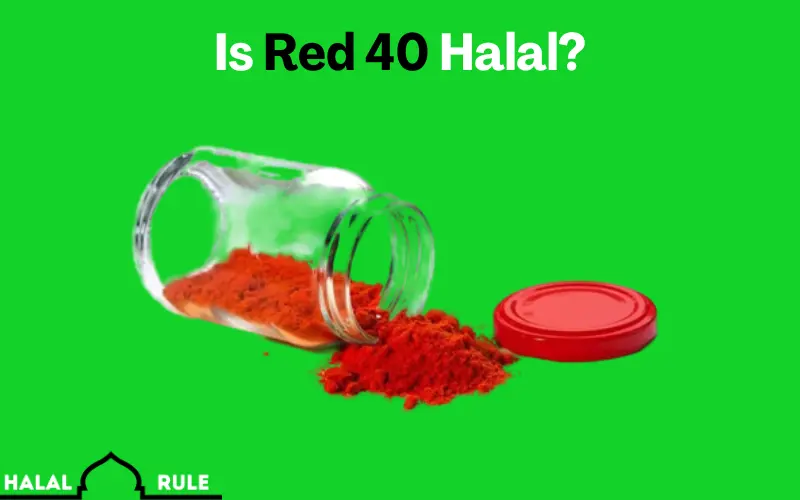Is Red 40 Halal Or Haram In Islam?
You might have seen Red 40 or Allura Red AC listed as an ingredient in many food products. It is a synthetic food dye commonly used to give a vibrant red color to food and beverages.
However, for those following a halal diet, the question arises is Red 40 halal?
This is because as per Islamic dietary laws, certain foods and ingredients are considered halal (permissible) while others are considered haram (forbidden).
In this blog post, we will delve deeper into the topic of Red 40 and its halal status. So if you’re curious to know whether you can consume food products containing Red 40 while following a halal diet, keep reading.

Is Red 40 Halal?
Yes, Red 40 is considered halal by Islamic dietary laws. This is because it is derived from synthetic or artificial sources rather than animals or alcohol, both of which are prohibited in halal diets.
Red 40 is made from petroleum and does not contain any animal products or alcohol in its production process. Therefore, it does not violate the basic principles of halal consumption.
However, some may argue that consuming synthetic ingredients goes against the idea of natural and wholesome food in Islam.
However according to Islamic scholars, as long as these ingredients do not contain any haram substances, they are considered halal.
Also, Red 40 is considered vegan safe for consumption by government regulatory bodies such as the Food and Drug Administration (FDA) in the United States.
Also see is yellow 5 halal or is blue 1 halal.
What Is Red 40?
Red 40 is a food coloring agent that belongs to the azo dye family. It is also known as Allura Red AC, and its chemical name is C.I. 16035.
It has a bright red hue and is water-soluble, making it suitable for use in various food products such as candies, beverages, baked goods, sauces, and more.
Red 40 is also known as a certified color, which means it is approved by regulatory authorities such as the U.S. Food and Drug Administration (FDA) for use in food products.
It is commonly used to replace the natural red color of fruits and vegetables in processed food items.
Sometimes Red 40 is listed as an “artificial color” or “color added” in the ingredient list, making it difficult to identify. But if you see FD&C Red 40 or E129 on the label, it is an indication of Red 40’s presence in the food product.
You can also learn are red doritos halal.
Health Concerns
Red 40 has been a controversial ingredient due to its potential health risks. However, most of these concerns are related to high doses used in animal studies rather than minimal amounts found in food products.
Some studies have linked Red 40 consumption with hyperactivity and other behavioral changes in children. However, the FDA has deemed Red 40 safe for consumption at current levels used in food products.
If you have any concerns about consuming Red 40, it is best to consult with a healthcare professional.
Common Food Products Containing Red 40
As mentioned earlier, Red 40 is a commonly used food dye. Some common food products that contain Red 40 are:
- Candies and candies coated with red color
- Soft drinks and other beverages
- Baked goods such as cakes, cookies, and doughnuts
- Sauces like barbecue sauce or ketchup
- Yogurts and other dairy products
- Jams, jellies, and preserves
- Cereals and breakfast bars
- Packaged snacks like chips or crackers
It is essential to check the other ingredient list of these food products before purchasing if you are following a strict halal diet.
How Red 40 Is Used In Food Products
Red 40 is used in food products for various purposes, such as:
- Adding color to enhance the visual appeal of food products
- Masking undesirable colors or changes in color due to processing
- Maintaining consistency and uniformity in color throughout batches of a product
- Providing an alternative to natural sources of red pigment that may be expensive or unstable
In some cases, Red 40 is also used as a flavor enhancer or to provide a tangy taste to food products.
How Red 40 Is Made?
Red 40 is produced through a chemical process using petroleum as the base material. Petroleum is reacted with other chemicals to create a compound called p-cresidine, which is then further processed to form Red 40.
The manufacturing process is closely monitored and regulated by government agencies to ensure the safety and purity of the final product.
If you like jelly, you must learn is hartleys jelly halal.
Where Is Red 40 Commonly Used?
Red 40 is a popular food coloring and is commonly used in a variety of foods and beverages, including candies, desserts, soft drinks, and processed meats. It can also be found in some cosmetics and pharmaceutical products.
So, if you see Red 40 listed as an ingredient, it doesn’t mean the product is halal or not, as it can be used in both halal and non-halal products.
The Red 40 itself is halal, but it is always important to check the other ingredients in a product to ensure overall halal compliance.
FAQs
Q. Is red 40 haram?
A. No, Red 40 is not considered haram as it does not contain any animal derivatives or alcohol.
Q. Is red 40 vegan?
A. Yes, Red 40 is considered vegan safe as it does not contain any animal products.
Q. Is red 40 lake halal?
A. Yes, Red 40 Lake is also considered halal as it is a form of Red 40 that has been treated with aluminum to make it insoluble in water.
Q. Is red 40 halal in USA?
A. Yes, Red 40 is considered halal in the USA as it does not contain any haram substances and also has FDA approval for safe consumption.
Q. What is red 40 made from?
A. Red 40 is made from petroleum through a chemical process.
Q. Is red 40 e129 halal?
A. Yes, Red 40 (E129) is considered halal as it does not contain any haram substances.
Q. Is Allura red halal?
A. Allura Red, also known as Red 40, is considered halal by Islamic dietary laws.
Q. Can Muslims eat red 40?
A. Yes, Muslims can consume products containing Red 40 as it is considered halal. However, they should always check the other ingredients in a product to ensure overall halal compliance.
Conclusion
In conclusion, Red 40 is considered halal and vegan safe for consumption by Islamic dietary laws and government regulatory bodies.
However, its potential health risks have raised concerns among some individuals, so it is always best to consume it in moderation and consult with a healthcare professional if needed.
Always remember to check the ingredient list of food products before consuming them, especially if you are following a strict halal diet.
Now that you know more about Red 40 and its halal status, you can make informed choices when it comes to your food consumption.
I hope your search is red 40 halal has been answered, and this article has provided you with valuable information.






